新人教版高一英语知识点
高一英语人教版必考知识点汇总

高一英语人教版必考知识点汇总人教版高一英语知识点总结1一、一般过去将来时1.概念:立足于过去某一时刻,从过去看将来,常用于宾语从句中。
2.时间状语:The next day (morning, year。
),the following month(week。
),etc.3.基本结构:主语+was/were +going to + do+其它;主语+would/should + do+其它4.否定形式:主语+was/were+not + going to + do; 主语+would/should + not + do.5.一般疑问句:was或were放于句首;would/should 提到句首。
6.例句:He said he would go to Beijing the next day.他说他第二天要去北京。
I asked who was going there.我问,谁要去那里。
二、现在进行时1.概念:表示现阶段或说话时正在进行的动作及行为。
2.时间状语:Now, at this time, days, etc. look. listen3.基本结构:主语+be +doing +其它4.否定形式:主语+be +not +doing+其它5.一般疑问句:把be动词放于句首。
6.例句:How are you feeling today?你今天感觉如何?He is doing well in his lessons.在课上他表现得很好。
人教版高一英语知识点总结2【现在完成时】1. 表示过去发生或已经完成的某一动作对现在造成的影响或结果。
[例句] —Have you had your supper yet? —Yes, I have just had it.2. 常与介词for, during, in, within, over等引导的时间状语连用, 表示过去的某一行为一直延续到现在。
[例句] I haven’t seen my English teacher for a long time.3. 表示反复或习惯性的动作, 常与several times, once, twice, frequently等频度副词连用。
新人教版高一英语必修一知识点复习整理

新人教版高一英语必修一知识点复习整理1. 语法知识点
- 介词的用法
- 表示时间、地点和方式等
- 注意介词和动词的搭配
- 冠词的用法
- 不定冠词a和an的用法
- 定冠词the的用法
- 名词的单复数形式
- 一般名词的复数形式
- 不规则名词的复数形式
2. 词汇知识点
- 常用动词短语
- 与各种情境相关的常用动词短语
- 包括表示喜欢、讨厌、担心、希望等意思的动词短语
- 常用形容词及副词
- 描述人、事物特征的常用形容词
- 表示时间、程度、方式等的常用副词- 高频词汇
- 重点掌握高频出现的单词和常用短语3. 阅读技巧
- 预测文意
- 根据上下文预测单词或句子的意思
- 联系上下文理解文章
- 通过上下文的线索来理解全文意思
- 抓住文中关键信息
- 注意文章中的重点句子,理解文章主旨4. 写作技巧
- 语法正确性
- 注意动词时态和主谓一致
- 尽量避免语法错误
- 结构完整性
- 确保文章有开头、主体和结尾
- 逻辑连贯性
- 使用适当的连接词
- 使用连接词使句子和句子之间衔接紧密
以上是《新人教版高一英语必修一》的知识点复习整理,希望对你的学习有所帮助。
新教材 人教版高中英语必修第一册全册各单元重点语法汇总
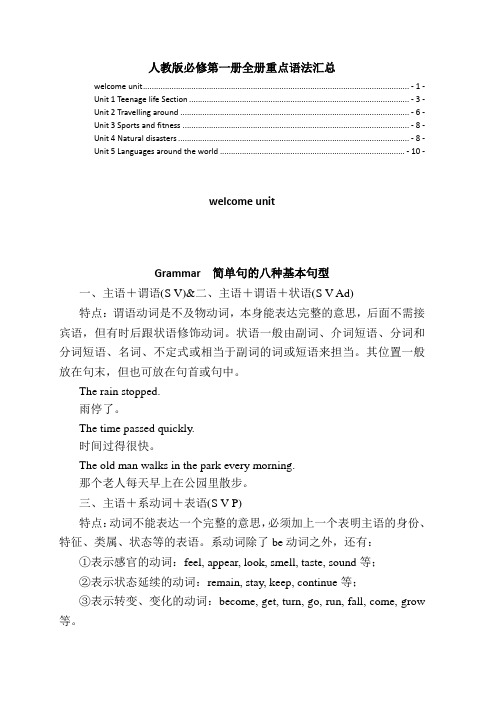
人教版必修第一册全册重点语法汇总welcome unit ......................................................................................................................... - 1 -Unit 1 Teenage life Section .................................................................................................... - 3 -Unit 2 Travelling around ........................................................................................................ - 6 -Unit 3 Sports and fitness ....................................................................................................... - 8 -Unit 4 Natural disasters ......................................................................................................... - 8 -Unit 5 Languages around the world .................................................................................... - 10 -welcome unitGrammar简单句的八种基本句型一、主语+谓语(S V)&二、主语+谓语+状语(S V Ad)特点:谓语动词是不及物动词,本身能表达完整的意思,后面不需接宾语,但有时后跟状语修饰动词。
新教材 人教版高中英语必修第一册全册各单元知识点提炼汇总(单词短语语法写作等)
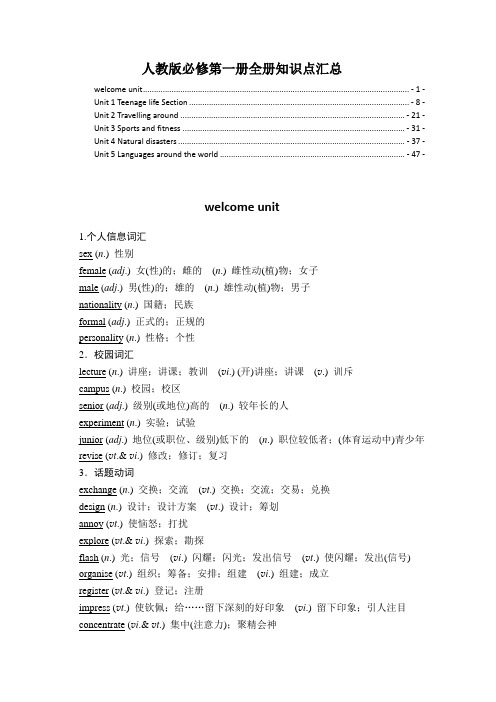
人教版必修第一册全册知识点汇总welcome unit ......................................................................................................................... - 1 - Unit 1 Teenage life Section .................................................................................................... - 8 - Unit 2 Travelling around ...................................................................................................... - 21 - Unit 3 Sports and fitness ..................................................................................................... - 31 - Unit 4 Natural disasters ....................................................................................................... - 37 - Unit 5 Languages around the world .................................................................................... - 47 -welcome unit1.个人信息词汇sex (n.) 性别female (adj.) 女(性)的;雌的(n.) 雌性动(植)物;女子male (adj.) 男(性)的;雄的(n.) 雄性动(植)物;男子nationality (n.) 国籍;民族formal (adj.) 正式的;正规的personality (n.) 性格;个性2.校园词汇lecture (n.) 讲座;讲课;教训(v i.) (开)讲座;讲课(v.) 训斥campus (n.) 校园;校区senior (adj.) 级别(或地位)高的(n.) 较年长的人experiment (n.) 实验;试验junior (adj.) 地位(或职位、级别)低下的(n.) 职位较低者;(体育运动中)青少年revise (v t.& v i.) 修改;修订;复习3.话题动词exchange (n.) 交换;交流(v t.) 交换;交流;交易;兑换design (n.) 设计;设计方案(v t.) 设计;筹划annoy (v t.) 使恼怒;打扰explore (v t.& v i.) 探索;勘探flash (n.) 光;信号(v i.) 闪耀;闪光;发出信号(v t.) 使闪耀;发出(信号) organise (v t.) 组织;筹备;安排;组建(v i.) 组建;成立register (v t.& v i.) 登记;注册impress (v t.) 使钦佩;给……留下深刻的好印象(v i.) 留下印象;引人注目concentrate (v i.& v t.) 集中(注意力);聚精会神improve (v i.& v t.) 改进;改善4.话题描述性词汇anxious (adj.) 焦虑的;不安的annoyed (adj.) 恼怒的;生气的frightened (adj.) 惊吓的;害怕的outgoing (adj.) 爱交际的;外向的awkward (adj.) 令人尴尬的;难对付的confident (adj.) 自信的;有把握的curious (adj.) 好奇的;求知欲强的forward (ad v.) (also forwards) 向前;前进(adj.) 向前的;前进的5.话题名词registration (n.) 登记;注册;挂号nation (n.) 国家;民族;国民designer (n.) 设计者impression (n.) 印象;感想confidence (n.) 信心;信任guy (n.) 小伙子;男人;家伙organisation (n.) 组织;团体;机构goal (n.) 目标;球门;射门strategy (n.) 策略;策划partner (n.) 同伴;配偶;合伙人company (n.) 公司;商行;陪伴style (n.) 方式;作风6.话题短语senior_high_school 〈美〉高中at_last 终于;最终make_an_impression 留下好印象what_if 要是……会怎么样呢concentrate_on 集中精力于leave ... alone 不打扰;不惊动junior_high_school 〈美〉初级中学look_forward_to 盼望,期待take_notes 记笔记flash_card 教学卡片;识字卡重点知识合作探究Our school invited two engineers to design_a_language_lab_for_us.我们学校邀请了两位工程师为我们设计一个语言实验室。
人教版高一英语必修一知识点总结

人教版高一英语必修一知识点总结人教版高一英语必修一知识点总结(一)1.preferPrefer doing …to doing…Prefer to do rather than do2.advantages /disadvantages 优势/劣势2.Ever since middle school, my sister Wang Wei and I have dreamed about taking a great bike trip. 从高中起,我姐姐王维和我就一直梦想做一次伟大的自行车旅行。
连词since 引导的时间状语从句用一般过去时,介词since 与时间点连用It is/has been+一段时间+since+一般过去时自从……至今已经多久了。
3. persuade sb to do sth= persuade sb into doing sth 说服某人做某事4. 强调句型 It is/was+被强调部分+that/who强调句型可以强调除谓语动词以外的任何句子成份。
一般来说,如果被强调部分是人时,用连词that或who;如果被强调部分是物,只能用连词that。
not … until 的强调句5.be fond of 喜欢,喜爱6. Although 尽管,虽然,引导让步状语从句① although 从句多在句首, though 从句可在主句前、中、后任何位置,而且though 可以作副词用于句末,作“但是,不过”讲,而although 无此用法。
② as though(仿佛,好像),even though(即使,尽管)中不能用although。
③ though 引导的让步状语从句可以倒装(将表语、状语、情态动词后的动词原形前置到句首,此用法同as),而 although 不可以。
7. insist on doing sth/ sth. 一定要、坚持主张She insists on getting up early and playing her radio loudly.她老是一大早起来把收音机音量开大11.care about 关心在乎care for 喜欢,照料,照顾12.change ones mind 改变主意13. experience 经历/经验14. Once 可作为从属连词,作“一(旦)……就……”解,连接一个表示时间的状语从句。
人教版高一英语必修一知识点总结五篇
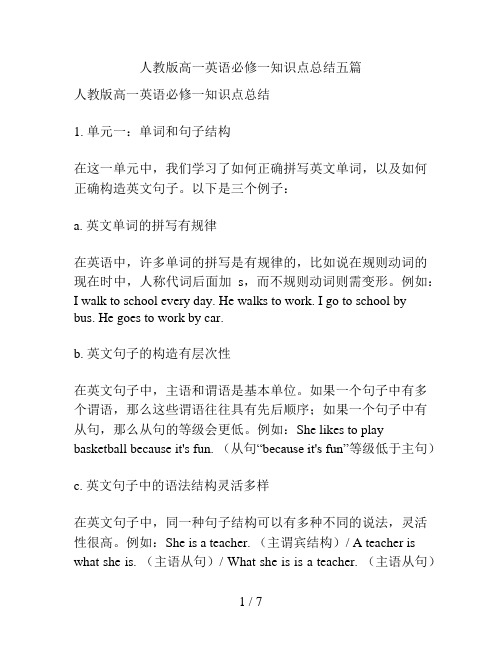
人教版高一英语必修一知识点总结五篇人教版高一英语必修一知识点总结1. 单元一:单词和句子结构在这一单元中,我们学习了如何正确拼写英文单词,以及如何正确构造英文句子。
以下是三个例子:a. 英文单词的拼写有规律在英语中,许多单词的拼写是有规律的,比如说在规则动词的现在时中,人称代词后面加s,而不规则动词则需变形。
例如:I walk to school every day. He walks to work. I go to school by bus. He goes to work by car.b. 英文句子的构造有层次性在英文句子中,主语和谓语是基本单位。
如果一个句子中有多个谓语,那么这些谓语往往具有先后顺序;如果一个句子中有从句,那么从句的等级会更低。
例如:She likes to play basketball because it's fun. (从句“because it's fun”等级低于主句)c. 英文句子中的语法结构灵活多样在英文句子中,同一种句子结构可以有多种不同的说法,灵活性很高。
例如:She is a teacher. (主谓宾结构)/ A teacher is what she is. (主语从句)/ What she is is a teacher. (主语从句)2. 单元二:课文阅读在这一单元中,我们学习了如何正确理解英文课文的内容,并提高了对英文阅读的兴趣和能力。
以下是三个例子:a. 英文课文中的语言运用丰富多样英文课文中的语言运用很丰富,包括比喻、暗示、转喻等等,需要我们认真阅读并理解。
例如:The sky was a bright shade of blue. (比喻)/ Her words cut him like a knife. (转喻)b. 英文课文中的句式多种多样英文课文中的句式也很多样,有短句和长句、简单句和复合句等等。
我们需要慢慢地理解它们,并掌握如何从中获取信息。
高中英语(新人教版)必修一知识点归纳

高中英语必修一知识点归纳Welcome Unit知识点归纳Part one Vocabulary1. exchange n.交换;交流vt.交换;交流;交易;兑换In exchange (for...)作为(与......的)交换exchange student 交换生exchange A for B 以A交换B:把A兑换成B exchange sth. with sb. 与某人交流/交换某物exchange opinions/ideas/views交流意见/想法/看法2. design1) n. 设计;图案;构思;打算,意图。
make designs for 为......做设计by design(=on purpose)故意地2) vt.设计,构思;计划;意欲。
design sth. for... 为...设计某物be designed to do... 旨在做...,用于做...3. anxious adj. 焦虑的;不安的be anxious for sb./ about sth. 为某人/某事担心be anxious for...渴望...be anxious (for sb.) to do sth. 渴望(某人)做某事be anxious that... 渴望...4. annoyed adj. 恼怒的;生气的be annoyed with sb.生某人的气be annoyed at/about sth.因某事生气be annoyed to do做...感到生气5. senior adj. 级别(或地位)高的n. 较年长的人senior high (school)高中be senior to sb. 比某人的地位/职位高6. impress vt. 使钦佩;给……留下深刻的好印象vi. 留下印象;引人注目have a(n) ...impression of... 对······有······印象leave/make a(n) ...impression on sb. 给某人留下······印象(be) under the impression that... 以为······,(通常指)误认为······7. concentrate on 集中精力于8. leave...alone 不打扰,不惊动9. explore vt.& vi. 探索;勘探exploration n. 探索,探测explorer n. 探险者;勘探者;考察者10. confident adj. 自信的;有把握的be confident about 对......有信心be confident of (doing) sth.对(做)······有把握be confident that... 确信······11. look forward to 盼望;期待12. organise vt. 组织;筹备;安排;组建vi. 组建;成立organisation n. 组织;团体;机构Part two Grammar句子成分和基本句型一、句子成分构成句子的各个部分叫作句子成分。
人教版高中英语必修一知识点+语法总结(全面)

人教版高中英语必修一知识点+语法总结(全面)-CAL-FENGHAI.-(YICAI)-Company One1高一主要语法点人教版必修一各单元知识点总结Unit One Friendship一、重点短语1.go through 经历,经受 get through 通过;完成;接通电话2. set down 记下,放下3. a series of 一系列4. on purpose 有目的的5. in order to 为了6. at dusk 傍晚,黄昏时刻7. face to face 面对面8. fall in love 爱上9. join in 参加(某个活动); take part in 参加(活动) join 加入(组织,团队,并成为其中一员)10. calm down 冷静下来11. suffer from 遭受12. b e/get tired of…对…感到厌倦13. be concerned about 关心14. get on/along well with 与…相处融洽15. be good at/do well in 擅长于…16. find it + adj. to do sth. 发现做某事是…17. no longer / not …any longer 不再…18. too much 太多(后接不可数n.) much too 太…(后接adj.)19. not…until 直到… 才20. it’s no pleasure doing sth 做… 并不开心 21. make sb. sth. 使某人成为… make sb. do sth. 使某人做某事二、语法----直接引语和间接引语概念:直接引语:直接引述别人的原话。
一般前后要加引号。
间接引语:用自己的话转述别人的话。
间接引语在多数情况下可构成宾语从句且不要加引号。
例:Mr. Black said, “ I’m busy.”Mr. Black said that he was busy.变化规则(一)陈述句的变化规则直接引语如果是陈述句,变为间接引语时,用连词that(可省略)引导,从句中的人称、时态、指示代词、时间状语、地点状语都要发生相应的变化。
人教版高中英语第一册知识点归纳

必修1:F r i e n d s h i p P 11.be good to … 对…好,对…和蔼,对…友好Why can't she be good to her sister为什么她不能对她姐姐好点2.survey 调查✧ a survey of 对…的调查,关于…的调查a survey of US businesses 对美国企业的调查✧survey shows/reveals that调查显示…The survey showed that Britain’s trees are in good heal th. 调查显示英国的树木状况良好;✧carry out/conduct a survey =do a survey进行调查✧We conducted a survey of parents in the village. 我们对这个村子的孩子父母作了一次调查;3.add 添加、增加、计算、相加✧add sth to sth 把…加入…中Do you want to add your name to the list 你想把你的名字加到名单里吗✧add sth and sth together 把…和…相加;Add 7 and 5 to make 12. 7加5得12;✧add to something 增加✧What he did has added to our difficulties. 他的所作所为增加了我们的困难;✧add up to 总计,加起来等于The cost added up to 100 million yuan. 费用总计达一亿元;4.until✧直到…为止The ticket is valid until March. 这张票的有效期一直到 3 月份;He waited until she had finished speaking. 他一直等到她讲完;✧not until直到…才〔用于强调某事在某个具体的时刻或者另一件事发生以前没有发生〕✧It was not until 1972 that the war finally came to an end. 直到 1972 年战争才终于结束;5.finish 停止✧finish doing sth 停止做某事停下正在做的事情✧I finished typing the report just minutes before it was due. 我在截止时间前几分钟才把报告打完;✧finish+ with以…为结尾The party finished with a song. 聚会以一首合唱结束;6.help 帮助✧help sb with sth帮助某人某事Can I help you with the washing up 我来帮你洗碗好吗My father said he’s going to help me with the fees. 父亲说费用问题他会帮我解决的;✧help sb to do sthI helped her to carry her cases up the stairs. 我帮她把箱子拎上了楼;She helped him choose some new clothes. 她帮他挑了一些新衣服;✧help to do sthShe was coming to help clean the machines. 她要来帮忙擦洗机器;7.plan n.计划、打算;vi & vt 计划、筹划、打算planning, planned, planned✧n.计划、打算;plan for…,…的计划有时候也会用介词ofHis plan is to work abroad for a year. 他计划去国外工作一年;Do you have any plans for the weekend 你周末有什么打算✧make a plan / make plans 做计划、制定计划、筹备;Mary has been busy making plans for her wedding. 玛丽一直在忙着筹划她的婚礼;✧carry out a plan=do what has been planned 实施计划They were arrested before they could carry out their plans. 他们在实施计划之前就被逮捕了;✧plan to do sth 计划去做某事/打算去做某事/谋划去做某事Maria didn’t plan to kill Fiona. It was an accident. 玛丽亚并非蓄意杀害菲奥娜,那是个意外;8.get vi & vt 获得、到达、收到、购买、取得…getting, got, gotten✧使某事发生在某人身上/某物上get it repairedYou’re going to get us all killed 你会让我们都没命的Don’t get yourself burned. 别烫到自己;9.upset✧adj. 心烦意乱的、不快的、烦躁的I was very upset because one of my friend was rude to me. 我很心烦,因为我的一个好朋友对我非常无礼;✧be upset aboutShe was deeply upset about the way her father treated her. 父亲那样对她,她非常难过;✧upset thatDebbie was upset that he didn’t spend more time with her. 他没有花更多的时间陪自己,黛比觉得不快;✧be upset with sb生某人的气,对某人感到不快You’re not still upset with me, are you 你不是还在生我的气吧✧ vt.使某人生气;使生气;使心烦意乱Don’t do anything that would up set him. 别做惹他生气的事情;His cheating in the exam upset his teacher. 他在考试中作弊,这使他的老师很生气;10.ignore vt.忽视、忽略、不理睬You can’t ignore the fact that many criminals never go to prison. 你不能无视很多罪犯从未获刑的事实;The phone rang, but she ignored it. 电话铃响了,但她只当没听见;11.calm adj. 静的、平静的、沉着的;n. 平静、宁静;vi & vt 使平静Glen was calm and composed at the funeral. 格伦在葬礼上表现得平静而镇定;✧remain/stay/keep calm 保持镇静、保持平静;I tried to stay calm and just ignore him. 我尽量保持镇定,不去理睬他;✧the calm before the storm n.平静暴风雨前的平静〔指激烈争论或严重问题出现前短暂的平静局面〕✧calm down恢复平静,恢复正常; calm sb down 使某人平静下来It took months for things to calm down after we had the baby. 我们有了宝宝后过了好几个月,家里的一切才恢复正常;She lit a cigarette to calm herself down. 她点了支烟,使自己平静下来;12.have got to do 必须,不得不;Have you got to go now 你非得现在走吗辨析:have got to 和have to的区别1)在表示一次性动作时,两者可以互换;I havegotto be back by 10 o’clock. 我十点前必须回来;2)当表示习气性动作时,特别是句子中有表示经常性的副词always、often等,则用have to, 而不用have got toI often have to get up at 5. 我常常要五点起床;3)have got to 几乎不用在过去时态中;In order to catch you, I had to walk very fast.为了赶上你,我不得不走得很快才行;4)have to 在使用时可以搭配助动词或情态动词;也可以用在停止体或完成体结构中,而have got to 不行;I shall have to help him as much as I can. 我将不得不尽我所能地去帮他;7.plan n.计划、打算;vi & vt 计划、筹划、打算planning, planned, planned✧n.计划、打算;plan for…, …的计划有时候也会用介词ofHis plan is to work abroad for a year. 他计划去国外工作一年;Do you have any plans for the weekend 你周末有什么打算✧make a plan / make plans 做计划、制定计划、筹备;Mary has been busy making plans for her wedding. 玛丽一直在忙着筹划她的婚礼;✧carry out a plan=do what has been planned 实施计划They were arrested before they could carry out their plans. 他们在实施计划之前就被逮捕了;✧plan to do sth 计划去做某事/打算去做某事/谋划去做某事Maria didn’t plan to kill Fiona. It was an accident. 玛丽亚并非蓄意杀害菲奥娜,那是个意外;8.get vi & vt 获得、到达、收到、购买、取得…getting, got, gotten✧使某事发生在某人身上/某物上get it repairedYou’re going to get us all killed 你会让我们都没命的D on’t get yourself burned. 别烫到自己;9.upset✧adj. 心烦意乱的、不快的、烦躁的I was very upset because one of my friend was rude to me. 我很心烦,因为我的一个好朋友对我非常无礼;✧be upset aboutShe was deeply upset about the way her father treated her. 父亲那样对她,她非常难过;✧upset thatDebbie was upset that he didn’t spend more time with her. 他没有花更多的时间陪自己,黛比觉得不快;✧be upset with sb生某人的气,对某人感到不快You’re not still upset with me, are you 你不是还在生我的气吧✧ vt.使某人生气;使生气;使心烦意乱Don’t do anything that would upset him. 别做惹他生气的事情;His cheating in the exam upset his teacher. 他在考试中作弊,这使他的老师很生气;10.ignore vt.忽视、忽略、不理睬You can’t ignore the fact that many criminals never go to prison. 你不能无视很多罪犯从未获刑的事实;The phone rang, but she ignored it. 电话铃响了,但她只当没听见;11.calm adj. 静的、平静的、沉着的;n. 平静、宁静;vi & vt 使平静Glen was calm and composed at the funeral. 格伦在葬礼上表现得平静而镇定;✧remain/stay/keep calm 保持镇静、保持平静;I tried to stay calm and just ignore him. 我尽量保持镇定,不去理睬他;✧the calm before the storm n.平静暴风雨前的平静〔指激烈争论或严重问题出现前短暂的平静局面〕✧calm down恢复平静,恢复正常; calm sb down 使某人平静下来It took months for things to calm down after we had the baby. 我们有了宝宝后过了好几个月,家里的一切才恢复正常;She lit a cigarette to calm herself down. 她点了支烟,使自己平静下来;12.have got to do 必须,不得不;Have you got to go now 你非得现在走吗辨析:have got to 和have to的区别5)在表示一次性动作时,两者可以互换;I havegotto be back by 10 o’clock. 我十点前必须回来;6)当表示习气性动作时,特别是句子中有表示经常性的副词always、often等,则用have to, 而不用have got toI often have to get up at 5. 我常常要五点起床;7)have got to 几乎不用在过去时态中;In order to catch you, I had to walk very fast.为了赶上你,我不得不走得很快才行;8)have to 在使用时可以搭配助动词或情态动词;也可以用在停止体或完成体结构中,而have got to 不行;I shall have to help him as much as I can. 我将不得不尽我所能地去帮他;13.be concerned about sb 关心某人He knows that you are always concerned about him. 他知道你一直关心他;14.take care of 照顾、照看、负责take, took, takenWe only have one earth, so we need to take care of her. 我们只有一个地球,所以我们必须要好好的照顾她; 15.walk the dog 遛狗She has to walk the dog every morning. 她每天早晨不得不遛狗;She had to walk the dog every morning last year. 去年,她每天早晨都不得不遛狗;16.take an exam 参加考试;take the end-of-term exam 参加期末考试When can I take an exam 我什么时间参加考试ugh at 取笑、嘲笑The suggestion he made was laughed at by the committee. 他提出的建议遭到了委员会的嘲笑;18.go through经历、经受或通过、经过、穿过✧He was going through a very difficult time. 他在经历一段非常艰难的时期;✧You must go through customs in order to pass across the border. 你要过境, 就必须在海关办理手续;19.set down 记下、放下、登记Old Walter is setting down his memories of village life. 老瓦尔特正在写他的乡村生活回忆录;Top priority for me is getting him off this plane so I can finally set down my gun.现在对于我来说最要紧的事就是让他下飞机,这样我就能放下我的枪了;20.a series of 一系列、一连串We learn language through a series of prompts and feedback.我们通过一系列的提示和反馈学习语言;21.want to do sth; want sb to do sth; want sth doneI want to go shopping tomorrow morning. 明天上午我想去购物;I want you to find out what they’re planning. 我要你查明他们有什么计划;I want that letter typed today. 我要那封信今天就打好;22.since✧自从…以来,就一直…通常与主句中完成式连用We’ve been waiting here since two o’clock. 我们从两点钟开始就在这里等了;I haven’t played rugby since I left university. 我大学毕业后就没打过橄榄球;She left London ten years ago, and I haven’t seen her since. 她十年前离开伦敦,此后我再没有见过她;23.hide away 躲藏、隐藏 hid, hidden✧hide动词,away为副词,宾语为代词时应放在两者中间She and her family hid away for nearly twenty-five months before they were discovered.她和她的家人躲了近二十五个月才被发现;As he didn’t want his sister to share his chocolate, he hid it away somewhere under the bed.因为他不想和妹妹分享巧克力,他把它藏在床下的某个地方了;24.on purpose 故意地✧反义短语:by accident/ by chance意外地,偶然地I stayed awake on purpose until half past eleven in order to have a good look at the moon.为了好好看看月亮,我故意醒着直到十一点半;Cinderella left her shoe on the stairs on purpose.灰姑娘故意把她的一只鞋子留在了台阶上;Rockets were probably invented by accident about 2000 years ago.火箭可能是在约两千多年前无意间被发明的;By chance I came across an article about her.很偶然地,我看到了一篇关于她的文章;25.in order to+ do 为了…✧否定形式:in order not to do sth…✧so as to 可与in order to 互换,作目的状语,但so as to 不能位于句首✧in order that/so that 引导目的状语从句,从句中常有情态动词can, may ,might, could 等,当主句和从句主语一致时,in order that / so that 可以和in order to/ so as to 互换;We got up early in order to/ so as to catch the early bus.=In order to catch the early bus, we got up early.=We got up early to catch the early bus.=We got up early in order that / so that we could catch the early bus.为了赶上早班车,我们起得很早;26.dare v. 敢于,胆敢✧dare 既可作为实意动词,也可作为情态动词;作实意动词时后面常接不定式to do sth, 在疑问句和否定句中to可省略,作情态动词使用时多用于否定句和疑问句;具体用法如下:✧肯定句中:实意动词dare to do sth 敢于做某事✧否定句中:实意动词:don’t/ doesn’t/ didn’t dare to do sth 不敢做某事情态动词:daren’t/ daredn’t do sth✧疑问句中:实意动词:Do/ Does/ Did +主语+ dareto do sth情态动词:Dare / Dared + 主语+ do sthHe dares to speak English before his class. 他敢在同学面前说英语He doesn’t dare to speak English before his class. 他不敢再同学面前说英语;=He d aren’t speak English before his class.Does he dare to speak English before his class 他敢在同学面前说英语吗=Dare he speak English before his class27.happen vi. 发生;碰巧✧happen to do/ be doing/ have done/ be done 碰巧要做/正在做/做过/被做✧happen to sb 某人遇到;某人遭到✧It just so happen s that… 碰巧…✧happen作“发生、碰巧”时,都是不及物动词,也不能用于被动语态;此外,take place, break out, occur, comeabout 这些短语也都无被动语态;Five months ago, I happened to be upstairs at dusk when the window was open.五个月前的一个傍晚,我碰巧在楼上,当时窗户是开着的;I happened to have seen the lost bike. 我碰巧见过那辆丢了的自行车;My mom tells me that I can’t control what happen to me.我妈妈告诉我,我控制不了发生在我身上的事;It just so happened that he was upstairs. = He happened to be upstairs.他碰巧在楼上;28.face to face 面对面✧face to face 短语作状语,用来修饰句子中的动词;✧“名词+介词+名词”结构的短语还有:shoulder to shoulder 肩并肩;back to back 背对背;side by side 肩并肩;step by step 逐步地;day after day 日复一日;year after year 年复一年;hand in hand 手牵手;arm in arm 臂挽臂;等等;✧face-to-face 是复合形容词,用来修饰名词,作定语;It’s better to talk with our friends face to face. 最好和我们的朋友面对面地交谈;The couple walked along the street side by side. 这对夫妻肩并肩沿着大街走;They went to a wonderful party yesterday. First, they danced face to face and then they had a face-to-face talk.29.no longer 不再✧no longer = not …any longer,表示时间上不再延续,修饰延续性动词;✧no more = not …any more,表示动作不再延续,数量不再增加或者程度不再加深,修饰非延续性动词;She no longer works here.= She doesn’t work here any longer. 她不在这里工作了;Time lost will return no more. = Time lost will not return any more. 失去的时间不会再回来;30.power n. 力量;能力;权力✧do everything in one’s power 尽全力做某事✧have the power to do sth 有做某事的能力✧be in power 执政,掌权强调状态✧come to power执政,掌权强调动作✧powerful adj. 有权势的,有能力的,有影响力的;反义:powerless adj. 无权的,无影响力的Knowledge is power. 知识就是力量;I will do everything in my power to help you. 我会尽全力帮助你;The president has the power to reject bills. 总统有权否决议案;31. 辨析:情态动词+ have done表示对过去事情的推测;注:虚拟语气中除外;1.could have done 可能做过某事表示比较肯定的推测/本能够做而未做2.may /might have done 可能做过某事表示不太确定的推测3.must have done 一定做过某事非常肯定4.can’t /couldn’t have done 不可能做过某事5.should have done = ought to have done本该做某事而未做6.shouldn’t have done = ought not to have done 本不该做某事却做了eg:史密斯先生不可能去了北京,因为我刚才在图书馆看见他了;Mr. Smith can’t have gone to Beijing, for I saw him in the library just now.对不起,我迟到了,我本该早点给你打电话的;I am sorry for being late. I should have phoned you earlier.你昨天本不该把真相告诉他的;You shouldn’t have told him the truth yes terday.32. make + 宾语+ 宾补make 是使役动词,它的宾补用省略to 的不定式、形容词、过去分词和名词;注意:make后面的宾补不能用现在分词,即:make sb doing×;make后面的宾补为省略to的不定式时,即make sb do sth,在变为被动语态时,to要还原;Her mother made her stay at home.→She was made to stay at home by her mother.1.make sb/sth do sth = have/let sb/sth do sth 使某人/某物去做某事2.make sb/sth done = have sb/sth done 使某人/某事被…3.make sb/sth + adj. 使某人/某物…4.make sb/sth + n. 使某人/某物成为…eg:他让她日夜工作;He made her work day and night.她大声说以便自己的话被听清楚;She spoke loudly so that she could make herself heard clearly.她通过了考试,这使她的父母感到自豪;She passed the exam, which make her parents proud.我们让他当队长;We made him captain of the team.33. keep + 宾语+ 宾补此结构表示“使…保持…”,宾补可以是形容词、副词、介词短语、现在分词或过去分词;注意:keep 后面的宾补不能用不定式,即keep sb/sth to do sth ×;但是后面的宾补可以用现在分词,即keep sb/sth doing sth.eg:他喜欢开着窗户睡觉;He likes to keep the window open while sleeping.他总是使车保持良好状态;He always keeps the car in good condition.对不起,让你久等了; I am sorry to keep you waiting so long.多听少讲; Keep your mouth shut and your ears open.34. wonder vi&vt 疑惑、想知道、怀疑;u.n.对优美事物或新鲜事物惊叹、惊奇;c.n.奇事、奇观;1. I wonder if/whether…我不知是否…此句型表示有礼貌地询问某事或请求帮助,其中if/whether引导宾语从句;多用于口语中;eg.: 不知您能否帮我的忙;I wonder if/whether you can help me.我可不可以要一杯饮料I wonder if I might have a drink2. wonder + who/what/how/where引导的从句,表示:想知道…eg.: 我想知道詹姆斯的近况;I wonder how James is getting on.3.n.eg.: 看见长城,我们满怀惊叹;The sight of the Great Wall filled us with wonder.世界七大奇观the Seven Wonders of the World4.it’s no/small/little wonder that 并不奇怪,不足为奇eg.: 怪不得你头痛,你昨晚喝太多了;No wonder you’ve got a he adache, the amount you drank last night.5.it’s a wonder that令人惊奇的是eg.: 竟然没有人受伤,真是奇迹;It’s a wonder no one got hurt.35. There was a time when…曾经有一段时间…此句结构为:when 引导的定语从句,修饰先行词a time, when 是关系副词,在从句中作时间状语;eg: 曾经有一段时间我很容易生气;There was a time when I became angry easily.曾经有一段时间我们幸福地生活在一起;There was a time we lived happily together.36. It/This/That +is/was +the first…/last time that +sb +现在完成时/过去完成时表示:这是某人第一次做…eg.: 这是我第一次看到这里;This/It is the first time that I have seen here.这是我第二次吃汉堡;This is the second time that I have eaten hamburgers.这是他第三次被警告有危险了;It was the third time that he had been warned of the danger.37. settle vi.定居;vt. 使定居、解决✧settle down 定居下来✧settle down todoingsth 安心做某事✧settler n. 移民eg.: 现在你该解决同你父亲之间的分歧了;It’s tim e for you to settle your differences with your father.他们把当地人迁移到别处定居;They moved the local people and settled them in another place.毫无疑问这是解决问题的最佳方式;There is no doubt that it is the best way to settle the problem.他们开始认真讨论问题;They settled down to a serious discussion.38. suffer vi.遭受、患病;vt.遭受、忍受✧suffer from 受…的折磨、患…病✧suffer pain/hardship/punishment 遭受痛苦/艰难/惩罚✧sufferer n.受苦难者、患病者✧suffering n.肉体或者精神上的痛苦、苦难eg.: 她遭受孤独的折磨,但在那里她必须学会喜欢它;She suffered from loneliness, but she had to learn to like it there.他的腿受伤了,疼痛难忍;His leg was broken and he suffered great pain.人们极其痛苦;The suffering of the people was extreme.39. recover vi & vt. 恢复✧recover from 从…中恢复✧recovery n. 恢复eg.: 在这么脏的房间里,琳达怎么能从疾病中恢复过来呢How could Linda recover from her illness in this dirty room从一场重感冒中恢复过来花了他很长时间;It took a long time for her to recover from a bad cold.It took her a long time to recover from a bad cold.她突然什么都看不见了,但是很快就恢复了视力;She couldn’t see anything suddenly but sh e quickly recovered her sight.医生们确信他会完全康复;The doctors are confident he’ll make a full recovery.40. get/be tired of 对…厌烦✧get/be tired of 对…感到厌倦✧get/be tired from 因…感到疲惫✧tire sb out 使某人感到疲惫不堪eg.: 我已经厌倦了透过脏兮兮的窗帘和布满灰尘的窗户看大自然了;I’ve got tire d of looking at nature through dirty curtains and dusty windows.读书经常使我疲劳,有时筋疲力尽,但我不讨厌读书;I am often tired from reading and sometimes I am tired out, but I am not tired of it.41. have trouble with …和某人有矛盾;在某事上有麻烦have trouble/difficulty/problems with sth. 做某事有困难have trouble/difficulty/problems in doing sth. 做某事有困难eg.: 现在我跟班上同学有些矛盾;I am having some trouble with my classmates at the moment.我通常知道我想说什么,但是用语言表达出来却有困难;I often know what to say but have trouble in expressing it in words.让我说服她让步极其困难;I had the greatest difficulty in persuading her to give in.我们毫不费力就找到了那个房子;We had no difficulty in finding the house.42. get along with 与…和睦相处在陈述句中,along 后面可用well、badly、nicely等副词修饰;在特殊疑问句中用how 来对这些副词提问;例:How are you getting on with you study 你的学习怎么样✧get along/on with sb 同某人相处融洽✧get along/on with sth 谈及或问及工作情况进展、进步✧get around 传播、流传✧get down to doing sth 开始做某事✧get together 相聚✧get out of sth 摆脱责任或义务、逃避✧get up 站起、起身、起床✧get over 克服、完成eg.: 我跟我们班一个男生相处得很好;I’m getti ng along well with a boy in my class.除此之外,我们应该学会如何与其他人和睦相处;In addition,we should learn how to get along with others.这消息一传开,人们都往这地方赶来;When the news got around, people quickly headed for this place.你应该开始认真地做些练习了,不然你就要落在别的同学后面了;You should get down to some practice or the other students will leave you behind.43. fall in love 相爱、恋爱✧fall in love with sb 爱上某人✧be in love with sb 爱着某人eg.: 那个男孩和那个女孩相爱了;The boy and the girl fell in love.她一直爱着住在另一个小镇上的那个男孩;She is in love with the boy living in another town.She is in love with the boy who is living in another town.44. join in 参加✧join sb. 跟某人一起✧join the party/the army/the club 入党/参军/参加俱乐部✧join in sth/doing sth 加入某事/做某事✧join sb. in doing sth. 加入某人做某事eg.: 他们邀请我加入篮球比赛; They invited me to join in the basketball game.They invited me to join in the basketball game.她只是听,但是从来不参与; She listens but never joins in .She listens but never joins in.我甚至加入了当地的钓鱼俱乐部,并且开始参加每月一次的会议;I joined the local fishing club and started to attend the monthly meetings.I even joined the local fishing club and started to attend the monthly meetings.我的家人和我一同向您表示问候;My family joined me in giving/sending our regards to you.My family joined me in sending our regards to you.辨析:join通常指加入某个团体或组织,宾语常是party、army、club或sb;join in指参与到某项比赛、游戏或活动中;take part in 指参加群众性的活动,强调参加该活动并在其中发挥一定作用;attend 常指出席或参加会议、仪式、婚礼、葬礼、典礼、上课、上学、听报告等;。
2023年人教版高一英语上册知识点()整理

2023年人教版高一英语上册知识点()整理高一新生要依据自己的条件,以及高中阶段学科学问交叉多、综合性强,以及考查的学问和思维触点广的特点,找寻一套行之有效的(学习(方法))。
下面我为大家带来人教版(高一英语)上册学问点,盼望对您有所关心!人教版高一英语上册学问点(一)、some与any的用法1.some用于确定句以及表示建议或期盼得到确定回答的问句。
修饰单数名词时,意为某个。
如:I have some questions about the assignment. (盼望得到确定答复)。
2. any用于否定句和疑问句时,表示一些。
用于确定句时,只和单数名词或不行数名词连用,表示任何。
如:The medicine is on sale every where. You can get it at any chemist?s.(二) 、each与every的用法1. each强调个体,表示两个或两个以上中的每一个,在句中可充当主语、宾语、定语和同位语。
如:There are trees and flowers at each side of the road.2. every强调整体,表示三者或三者以上中的每一个,只能作定语,不能说every of them,要说every one of them .Every student in our class works hard.(三)、no one与none的用法1. no one意为没有人,只能指人,不能指物,不行与介词of连用,谓语动词用单数形式,回答who引导的问句。
如:Who is in the classroom? No one.2. none既可指人,也可指物,强调数量,意为一点也不,一个也不;谓语动词既可用单数也可用复数;常与of连用,通常指三者以上的人或物中没有一个,回答how much和how many引导的问句。
如:They were all tired,but none of them would stop to have a rest.高一英语上册课文学问点1. travel----泛指旅行journey----指长时间长距离的陆上旅行voyage----指长距离的水上旅行,也可以指乘飞机旅行trip----常指短时间短距离的旅行tour----指周游,巡回旅游2. prefer A to B 比起B,更喜爱Aprefer doing to doing 比起做…,宁愿做…prefer to do rather than do 与其做…, 不如…3. flow through 流过,流经4. ever since 自从5. persuade sb. to do sth. 说服某人做某事6. be fond of 喜爱7. insist on doing 坚持做某事insist + that 从句(用should+ V原)8. care about 关怀9. change one’s mind 转变想法10. altitude 高度attitude 态度,看法11. make up one’s mind to do下定决心做某事= decide to do = make a decision to do12. give in 让步,屈服give up 放弃13. be surprised to… 对…感到惊异to one’s surprise 令某人惊异的是…14. at last = finally = in the end 最终15. stop to do 停下来去做某事stop doing 停止做某事16. as usual 像平常一样17. so…that 如此…以至于…so + adj + a/an + n. + thatsuch + a/an +adj. + n. + that18. be familiar with 对…熟识(人作主语) be familiar to 为…所熟识(物作主语)高一英语上册必修学问点1. because of 由于、由于2. come up 走近、上来、提出3. actually 实际上、事实上4. base 以…为基础,根基5. at present 目前6. make use of 利用7. such as 例如8. command 命令、指令、把握9. request 恳求、要求10. play a part/role in 扮演一个角色11. recognize 辨认出、承认、公认12. straight 直接、挺直、笔直的13. be different from 与…不同be the same as 和…一样14. one another 相互,彼此(=each other)15. at the end of 在…结束时16. because of 由于(后接名词或名词性(短语)) because 由于(后接(句子))17. be based on 依据,依据18. at present 目前;当今19. especially 特殊,尤其specially 特地地20. make use of 利用…make the best of 充分利用…21. a large number of 大量的,许多(作主语时,谓语动词用复数)the number of …的数量(作主语时,谓语动词用单数)22. in fact = actually= as a matter of fact 事实上23. make lists of… 列清单24. included 包括(前面接包括的对象)including包括(后面接包括的对象)25. command sb. to do sth. 命令某人去做某事command + that 从句(从句用should+V原)26. request sb. to do sth. 要求某人做某事request + that 从句(从句用should+V原)人教版高一英语上册学问点文档内容到此结束,欢迎大家下载、修改、丰富并分享给更多有需要的人。
人教版高中英语必修一知识点+语法总结(全面)
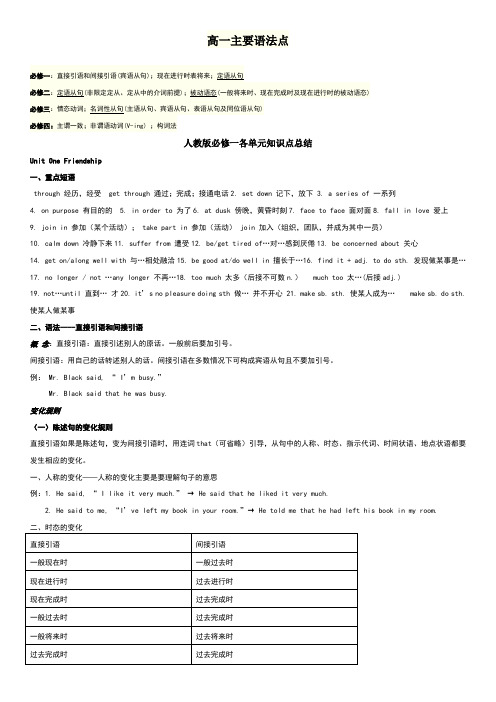
高一主要语法点人教版必修一各单元知识点总结Unit One Friendship一、重点短语through 经历,经受 get through 通过;完成;接通电话2. set down 记下,放下 3. a series of 一系列4. on purpose 有目的的5. in order to 为了6. at dusk 傍晚,黄昏时刻7. face to face 面对面8. fall in love 爱上9. join in 参加(某个活动); take part in 参加(活动) join 加入(组织,团队,并成为其中一员)10. calm down 冷静下来11. suffer from 遭受12. be/get tired of…对…感到厌倦13. be concerned about 关心14. get on/along well with 与…相处融洽15. be good at/do well in 擅长于…16. find it + adj. to do sth. 发现做某事是…17. no longer / not …any longer 不再…18. too much 太多(后接不可数n.) much too 太…(后接adj.)19. not…until 直到… 才20. it’s no pleasure doing sth 做… 并不开心 21. make sb. sth. 使某人成为… make sb. do sth. 使某人做某事二、语法----直接引语和间接引语概念:直接引语:直接引述别人的原话。
一般前后要加引号。
间接引语:用自己的话转述别人的话。
间接引语在多数情况下可构成宾语从句且不要加引号。
例:Mr. Black said, “ I’m busy.”Mr. Black said that he was busy.变化规则(一)陈述句的变化规则直接引语如果是陈述句,变为间接引语时,用连词that(可省略)引导,从句中的人称、时态、指示代词、时间状语、地点状语都要发生相应的变化。
人教版高一英语必修一Unit1知识点详解
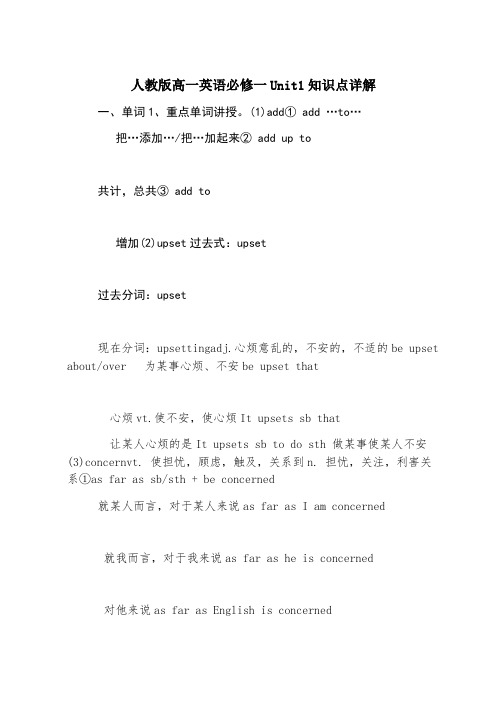
人教版高一英语必修一Unit1知识点详解一、单词1、重点单词讲授。
(1)add① add …to…把…添加…/把…加起来② add up to共计,总共③ add to增加(2)upset过去式:upset过去分词:upset现在分词:upsettingadj.心烦意乱的,不安的,不适的be upset about/over 为某事心烦、不安be upset that心烦vt.使不安,使心烦It upsets sb that让某人心烦的是It upsets sb to do sth 做某事使某人不安(3)concernvt. 使担忧,顾虑,触及,关系到n. 担忧,关注,利害关系①as far as sb/sth + be concerned就某人而言,对于某人来说as far as I am concerned就我而言,对于我来说as far as he is concerned对他来说as far as English is concerned关于英语,对于英语②be concerned about/f or关心,挂念have no concerned about/for③be concernedin/with触及到,与…有关have no concerned in/with(4)go through①经历,遭受,忍受go through one difficulty after another.经历一个又一个困难。
②仔细检查,审查go through your paper 检查你的试卷。
③浏览,翻阅go through all the related reference.浏览相干资料。
④通过,穿过=pass throughgo through a great forest.穿过一片大森林。
⑤完成go through the task.完成任务。
(5)suffer①suffer 作“遭受”时,后面直接接pain, loss, injury, harm或punishment.②suffer 作“受…苦”时,常常搭配:sufferfrom(6)get/be tired of厌烦…get/be/feel tired of sb / sth / doing sth 厌烦be tired from由于…而疲劳(体力上的疲劳),侧重原因be tired out精疲力竭的(7)join in 参加,加入区分join ,join in ,attend 与 take part in:join:多指加入组织,团体,党派等,有作为其中一员的意思。
全新人教版高一英语知识点2023
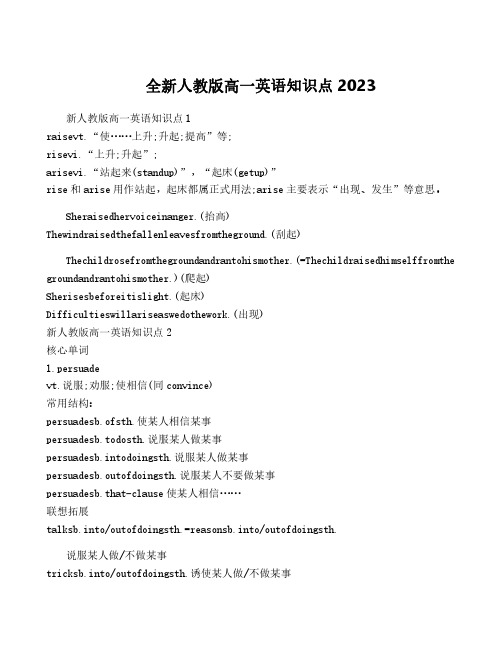
全新人教版高一英语知识点2023新人教版高一英语知识点1raisevt.“使……上升;升起;提高”等;risevi.“上升;升起”;arisevi.“站起来(standup)”,“起床(getup)”rise和arise用作站起,起床都属正式用法;arise主要表示“出现、发生”等意思。
Sheraisedhervoiceinanger.(抬高) Thewindraisedthefallenleavesfromtheground.(刮起)Thechildrosefromthegroundandrantohismother.(=Thechildraisedhimselffromthe groundandrantohismother.)(爬起)Sherisesbeforeitislight.(起床)Difficultieswillariseaswedothework.(出现)新人教版高一英语知识点2核心单词1.persuadevt.说服;劝服;使相信(同convince)常用结构:persuadesb.ofsth.使某人相信某事persuadesb.todosth.说服某人做某事persuadesb.intodoingsth.说服某人做某事persuadesb.outofdoingsth.说服某人不要做某事persuadesb.that-clause使某人相信……联想拓展talksb.into/outofdoingsth.=reasonsb.into/outofdoingsth.说服某人做/不做某事tricksb.into/outofdoingsth.诱使某人做/不做某事urgesb.into/outofdoingsth.怂恿某人做/不做某事易混辨析advise/persuadeadvise强调"劝告,建议"的动作,不注重结果;而persuade强调"已经说服",重在结果。
最新人教版高一英语必修一Unit1知识点详解
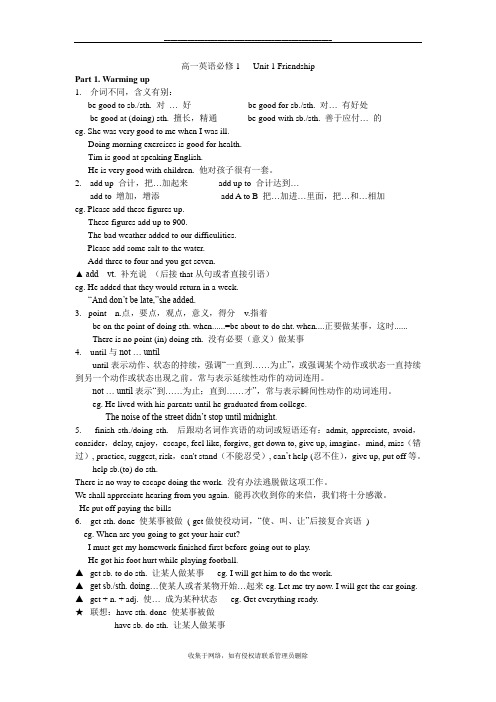
高一英语必修1 Unit 1 FriendshipPart 1. Warming up1.介词不同,含义有别:be good to sb./sth. 对… 好be good for sb./sth. 对… 有好处be good at (doing) sth. 擅长,精通be good with sb./sth. 善于应付… 的eg. She was very good to me when I was ill.Doing morning exercises is good for health.Tim is good at speaking English.He is very good with children. 他对孩子很有一套。
2.add up 合计,把…加起来add up to 合计达到…add to 增加,增添add A to B 把…加进…里面,把…和…相加eg. Please add these figures up.These figures add up to 900.The bad weather added to our difficulities.Please add some salt to the water.Add three to four and you get seven.▲ add vt. 补充说(后接that从句或者直接引语)eg. He added that they would return in a week.“And don’t be late,”she added.3.point n.点,要点,观点,意义,得分v.指着be on the point of doing sth. when......=be about to do sht. when....正要做某事,这时......There is no point (in) doing sth. 没有必要(意义)做某事4. until与not … untiluntil表示动作、状态的持续,强调“一直到……为止”,或强调某个动作或状态一直持续到另一个动作或状态出现之前。
人教版高中英语必修一知识点整理

~1. 语法:直接引语和间接引语(1)陈述句和疑问句friendship2.阅读及语言点:a.Anne’s best friend3.写作:建议信4.巩固练习Period2: language pointsPeriod3: using languagePeriod4:writingPeriod5:quiz语法直接引语和间接引语1. 直接引语在改为间接引语时,时态需要做相应的调整。
eg: “I broke your CD player.” (一般过去时改成过去完成时)He told me he had broken my CD player.Jenny said, “I have lost a book.”(现在完成时改成过去完成时)Jenny said she had lost a book.Mum said, “I’ll go to see a friend.”(一般将来时改成过去将来时)Mum said she would go to see a friend.过去完成时保留原有的时态He said, “We hadn’t finished our homework.”He said they hadn’t finished their homework.注意直接引语是客观真理,过去进行时,时态不变。
2.在直接引语变间接引语时,如果从句中的主语时第一人称或被第一人称所修饰,从句中的人称要按照主句中主语的人称变化。
如:Mary said, “My brother is an engineer.”Mary said her brother was and engineer.3.直接引语如果是反意疑问句,选择疑问句或一般疑问句,间接引语应改为由whether或if引导的宾语从句。
如:He said, “Can you run, Mike?”He asked Mike whether/if he could run.4. 直接引语如果是祈使句,间接引语应改为“tell(ask, order, beg等) * (not) to do sth.”句型。
高中英语新人教版知识点整理(必修一+必修二)(分单元编排)

高中英语必修一知识点整理U1Teenager life【四会词汇】volunteer /debate/prefer/content/challenge/confusing/recommend/advanced/obviously/solution/focus/schedule/quitfluent/responsible...【词组】be addicted to /sign up (for)/focus on /attract sb.to sth.be scheduled to do sth./a solution to …/have/take responsibility forbe responsible for sb/It is obvious that…/in advance/advanced technology/recommend sb. as.../recommend sb. to do sthprefer to do…rather than do/........【句型句式】1.so that引导目的状语从句2.Studying hard isn't always fu n…动名词(短语)作主语时,谓语动词要用单数形式3.在it作形式主语的句子中,真正的主语可以是不定式(短语)、动名词(短语)或从句4.make+宾语+宾语补足语【语法】名词短语、形容词短语、副词短语U2 Travelling around【四会词汇】contact/apply /amazing /amazed /unique/destination/arrangement /extremely/narrow/accommodation /admire /official /comment//credit/request /visa/economic/transport hike/tomb /unearth...【词组】apply for /Check out/Other than /in my view/put up/put down/put offBe based on/Make up/Be requested to do/credit card/lose one’s sight/comment on arrange for sb. to do sth/be recognized as/admire sb.for( doing)sth/.make contact with sb....【句型句式】1.as引导的时间状语从句2.until作介词和连词的用法3.现在分词(短语)作结果状语4.which引导的非限制性定语从句【语法】现在进行时表示将来U3 Sports and fitness【四会词汇】fitness /event /ski /host /track /sweat/legend/honour/determination /injure compete /pretend/audience/error/positive/championship /negative/pressure/cheat/legendgraceful /rather ....【词组】make it/make a difference/even if/though、fair play/compare…with/fall apartIn honor of/ give up/in the way/ by the way /fall down /speak highly of sb.../.come along...【句型句式】1.提建议常用句型Why not do sth.?2.here/there/now/then引起的完全倒装句3. even if/though 引导让步状语从句【语法】反义疑问句U4 Natural Disasters【四会词汇】disasters/rescue/ damage /destroy/affect /shelter /crack /shockTrap/bury/revive/unify/context/supply/emergency // summary ...【词组】it strikes sb. that…某人突然想到/crash into撞到……上/as usual和往常一样as if似乎;好像;仿佛/the number of……的数量/nothing but只有……/blow…away把……刮走、in the open air露天;在户外/on hand现有(尤指帮助)/carry out执行过着……的生活、out of gratitude出于感激....【句型句式】1.as if/though 引导的从句2.Leave +宾语+宾补【语法】限定性定语从句--关系代词U5 Languages around the world【四会词汇】native/attitude/despite/based /variety/major /regard /appreciatestruggle /equal/demand /description /relate ...【词组】refer to提及/date back(to...)追溯(到……)/point of view 观点/the attitude to/towards ……对……的态度/pay attention to /be of great importance /be known for/lead to /be connected with /play a...role in /be senior to / compare...with...aside from ...【句型句式】1.This/That is/was a time when...这是一个……的时期2.no matter+特殊疑问词(如who/what/where/when等)”均可引导让步状语从句3.as 引导状语从句,意为“随着”4.the+比较级, the+比较级越……,就越……5.动词+疑问词+to do 结构【语法】关系副词when/where/why引导的定语从句高中英语必修二知识点整理U1 Culturalheritage【四会词汇】preserve,application,balance,protest,likely, limit,prevent,loss,contribution,issue,conduct,donate,disappear,attempt,worthwhile,professional,forgive,quality,comparison,contrast.....【词组】take part in, give way to, keep balance,lead to,make a proposal, turn to,prevent...from, donate...to...等【句型句式】as 引导状语从句Not only 倒装句It ‘s said/reported that ........【语法】限制性定语从句“介词+关系代词”结构引导的定语从句U2 wildlife protection【四会词汇】concern vt.使忧虑/intend/remind v. 提醒,使某人想起/measure n. & v.searchv. 寻找/immediately adv.立刻/species n.物种./extinction n.灭绝/habitat n.(动植物的)生活环境;栖息地/average n.平均数/authority n.官方;当权/reserve.....【词组】be concerned with ...与……有关/die out灭绝/intend to do/doing sth.打算做某事take measures (to do sth.)“采取措施(做某事/measure sb./sth. against sb./sth.将……与……作比较/a mass of/ masses of 大片的/adopt to 收养/on average平均/.aware of 意识到...【句型句式】1.that引导定语从句2.Only前置,句子进行部分倒装3.for作为并列连词表示原因,用来引出并列分句,解释说话人为什么会说前面的话【语法】现在进行时的被动语态If 引导的真实条件状语从句一般现在时的被动语态U3 The internet【四会词汇】blogger/stuck/privacy/troll/cyberbully/embarrassing/define/blog/blog postChat/search engine/software/network/surf/charity/province/resident/ batteryButton/click/file/database/guideline....【词组】the global village/ raise money/online safety/ go through/a search engine/ a fitness planstream movies copy the file/look up information/ take steps/a nonsense name /bank accountthe key information get in shape/follow the rules/ stay safe/catch one’s attention /a thing or twowait in line/give out/develop an illness/ make trouble....【句型句式】“now that”经常用于句首,表示提醒他人注意,翻译成“因为”no matter+特殊疑问词”形成的连词可以引导让步状语从句【语法】现在完成时的被动语态U4 History and traditions【四会词汇】county/snack/roll/pub/wine/beer/military/landscape /cattle/nearby/oceanMansion/cemetery/descendant/heel/chief/puzzle/currency/conquer/fascinating/court yard/feastDot/roar/scent/stew/sensory/striking/Transition.....【词组】well-organized很有条理的/break away from摆脱,脱离/historic buildings历史建筑take over/接管/cultural traditions文化传统/as well as也,和/a scent of一种…味道keep your eyes open关注/as to至于/date back to 追溯到/through the history在历史上get charged充电/chief advantages主要优点/The amount of …的数量........【句型句式】“it”做形式主语,“to do”不定式做真正主语的句式结构过去分词,作为修饰语,起补充说明作用【语法】过去分词作定语和定语补足语U5 Music【四会词汇】composition/virtual/opportunity/enable/original/previous/phenomenon/Capable/relief/impact/aim/assume/addition/satisfaction/various/....【词组】absorbed in sth/ set sth up /fall in love 爱上/reflect on认真思考/be aimed to do sth. 目标在于/in addition to 除…之外/heart and soul 全心全意地/enable sb, to do sth.使某人能够做某事/in reaction to sth. 对…的反应/be equipped with 配有/have animpact\effect\influence on/...【句型句式】As it turned out,....../As is mentioned above,....It’s my honour to.......【语法】过去分词作表语和状语。
新版人教版高中英语必修一Unit1TeenagelifeSectingI知识点总结和习题

新版人教版高中英语必修一Unit1TeenagelifeSectingI知识点总结和习题新版人教版高中英语必修一Unit 1 Teenage lifeSecting I知识点和习题1.Volunteer Clubvolunteer(1)n志愿者,义务工作者;自告奋勇者Susan had quit her well-paid job and was working as a volunteer in the community when I visited her last year. (2)vi&vt 自愿(做某事),自告奋勇做某事。
常用搭配:volunteer to do sth.自愿/主动提出做某事volunteer for…自愿……;自愿为……服务According to the research, people feel good when they volunteer to do something meaningful for other people. He volunteered for military service.拓展:volunteer to do sth近义表达:offer to do sth主动提出做某事be willing /ready to do sth 愿意做某事voluntanry 自愿的;主动的;志愿的do voluntary work 做志愿工作voluntarily 自愿地;主动地2.Debate Club辩论社团debate(1)n 辩论,争论,讨论under debate正在讨论中/正在辩论中a heated/ lively detate 一场激烈/热烈的争论(2)vi&vt (尤指正式)辩论,讨论debate (with sb.) about/ on/ over sth. (与某人)辩论/讨论某事讨论:debate + 特殊疑问词+ to dodebate + wh-从句3.Predict content 预测内容predict vt 预言,预告,预测predict + wh-从句预演……predict (that) …预测……It’s predicted that…据预测/据预报……(It 做形式主语,that 引导的从句为真正的主语)The first step in awakening senses is to stop predicting what we are going to see and feel before it occurs.It’s difficult to predict who will because two side are competitive.She predicted (that) the election result would be close.It is predicted that the weather will get better tomorrow.拓展:predictable 预见的;可预料的unpredictable 不可预测的prediction 预言,预测make a prediction 做预言,做预测单词测试题单词拼写1. She kept the_______(内容) of the letter a secret.2. His parents thought it abnormal for a boy tobe interested in_______(芭蕾舞).3. Teachers have to bring on the bright childrenand at the same time give____(额外的) helpto those who need it.4. Children can often do these puzzlesmore easily than________(成年人),5. I found out by chance that she was actually a____________(一年级学生) from London University.6.Lewis was much admired for his work on American _________(文学).17. She was considered a great beauty in her_________(青年时期).8. Good books are like a wise and nice man of last____________(一代), who supports me to walk forward, and helps me to understand the world9. We know that_______(温室) gases can affect the climate.10. It is easy to forget that learning values andc haracter at home is as important as any schoolwork or __________(课外)activity.写作应用文写作(满分15分)假设你是李华,你收到朋友李磊的信,他告诉你他不适应高一数学老师讲的课,在学习数学方面有些困难,以至于跟不上其他同学,因此他感到非常着急。
人教版高一英语语法知识点总结_高一英语知识点归纳
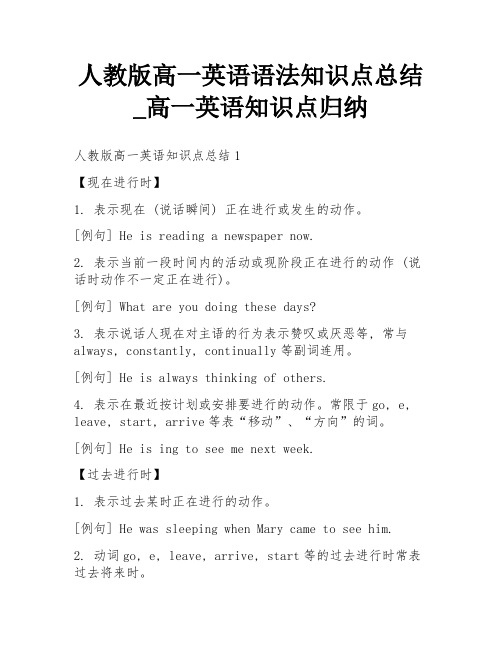
人教版高一英语语法知识点总结_高一英语知识点归纳人教版高一英语知识点总结1【现在进行时】1. 表示现在 (说话瞬间) 正在进行或发生的动作。
[例句] He is reading a newspaper now.2. 表示当前一段时间内的活动或现阶段正在进行的动作 (说话时动作不一定正在进行)。
[例句] What are you doing these days?3. 表示说话人现在对主语的行为表示赞叹或厌恶等, 常与always, constantly, continually等副词连用。
[例句] He is always thinking of others.4. 表示在最近按计划或安排要进行的动作。
常限于go, e, leave, start, arrive等表“移动”、“方向”的词。
[例句] He is ing to see me next week.【过去进行时】1. 表示过去某时正在进行的动作。
[例句] He was sleeping when Mary came to see him.2. 动词go, e, leave, arrive, start等的过去进行时常表过去将来时。
[例句] She said she was going to Beijing the day after tomorrow.人教版高一英语知识点总结2各种时态的被动语态被动语态概述被动语态的概念:它是动词的一种形式,表示主语与谓语之间的执行或被执行关系。
主动语态表示主语是谓语动作的执行者,例如:They saw the little boy crying by the river. 被动语态表示主语是谓语动作的承受者,例如:The little boy was seen crying by the river.被动语态的构成被动语态的形式是由“助动词be+动词的过去分词”构成。
助动词be随着主语的人称、数、时态等的不同而变化。
新人教版高一英语必修一第四单元知识点
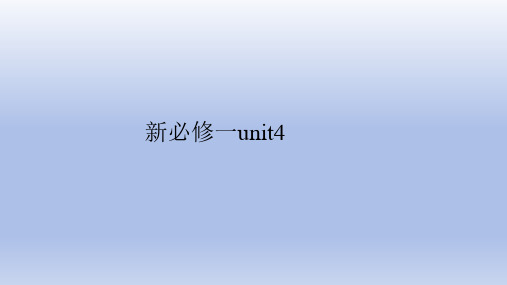
v. 毁坏;毁掉;使破产
I was ruined by the law case. 我被那场官司搞得倾家荡产。 ruin oneself 毁掉自己 ruin one’s hopes 使某人希望破灭
【拓展】destroy, ruin, damage的区别 ①damage指部分“损坏”、“破坏”或指使用价值有所降低。它可以用
灭”解,也可以指希望、计划等打破。 His hope of being a writer was destroyed. 他想成为一个作家的希望破灭了。
③ruin则表示破坏严重,以致不能修复,但这种破坏不像destroy那样毁灭某 物,而是强调致使该物的使用价值发生了问题。用作动词时,它
作“使毁灭”、“使崩溃”解;用作名词时,它表示“毁灭”、“瓦解”、 “废墟”等抽象概念。
这三个词都是形容词: electric 多指用电作为动力的。 electrical表示与电力生产或使用相关的。 electronic电子的,电子器件的
作动词,也可以用作名词,用作名词时常与to something 连用。 Hundreds of houses in the area were damaged by the storm. 暴风雨毁坏了这
个地区数以百计的房屋。 ②destroy只能用作动词,指彻底破坏,以致不可能修复,常作“破坏”、“毁
【随堂练习】汉译英: 1. 看到邻居们如何对待孩子,我感到震惊。 _____________________________________________________________
2. 他妻子去世的消息对他打击太大了。 _____________________________________________________________
- 1、下载文档前请自行甄别文档内容的完整性,平台不提供额外的编辑、内容补充、找答案等附加服务。
- 2、"仅部分预览"的文档,不可在线预览部分如存在完整性等问题,可反馈申请退款(可完整预览的文档不适用该条件!)。
- 3、如文档侵犯您的权益,请联系客服反馈,我们会尽快为您处理(人工客服工作时间:9:00-18:30)。
新人教版高一英语知识点
【篇一】新人教版高一英语知识点
raise vt.“使……上升;升起;提高”等;
rise vi.“上升;升起”;
arise vi.“站起来(stand up)”,“起床(get up)”
rise和arise用作站起,起床都属正式用法;arise主要表示“出现、发生”等意思。
She raised her voice in anger. (抬高)
The wind raised the fallen leaves from the ground. (刮起)
The child rose from the ground and ran to his mother. (=The child raised himself from the ground and ran to his mother.) (爬起) She rises before it is light. (起床)
Difficulties will arise as we do the work. (出现)
【篇二】新人教版高一英语知识点
核心单词
1. persuade
vt.说服;劝服;使相信(同convince)
常用结构:
persuade sb. of sth. 使某人相信某事
persuade sb. to do sth. 说服某人做某事
persuade sb. into doing sth. 说服某人做某事
persuade sb. out of doing sth. 说服某人不要做某事
persuade sb. that-clause 使某人相信……
联想拓展
talk sb. into/out of doing sth.=reason sb. into/out of doing sth.
说服某人做/不做某事
trick sb. into/out of doing sth. 诱使某人做/不做某事
urge sb. into/out of doing sth. 怂恿某人做/不做某事
易混辨析
advise/persuade
advise 强调”劝告,建议”的动作,不注重结果;而persuade强调”已经说服”,重在结果。
用法上:advise可跟v.-ing形式作宾语,也可以接that-clause (that sb. should do),而persuade则不能。
I persuaded him of its truth. 我使他相信这是真的。
We will persuade him to take the medicine.
我们将说服他把药吃下去。
We persuaded her into taking the job.
我们说服她接受了这份工作。
I persuaded my father out of smoking.
我劝服父亲戒了烟。
